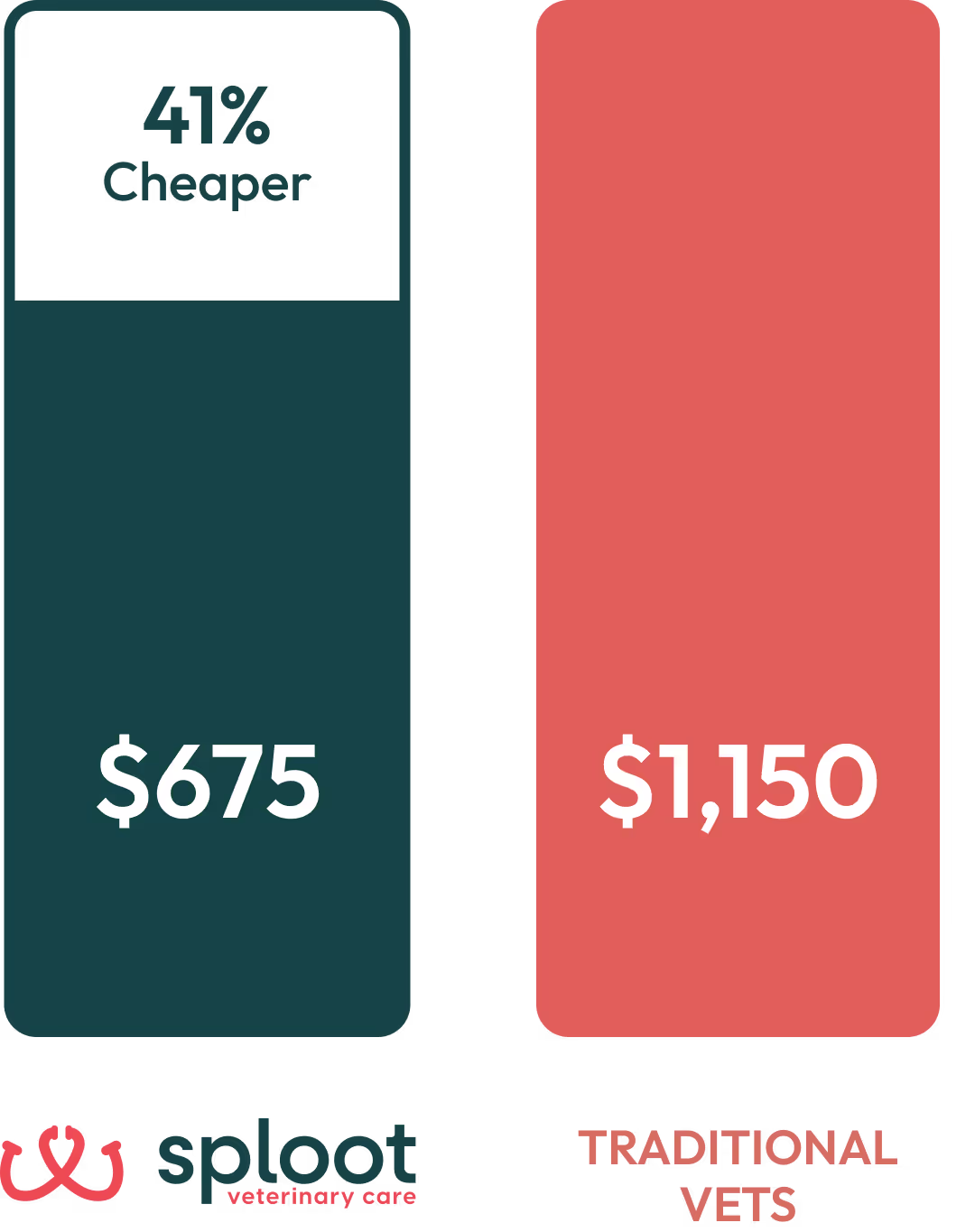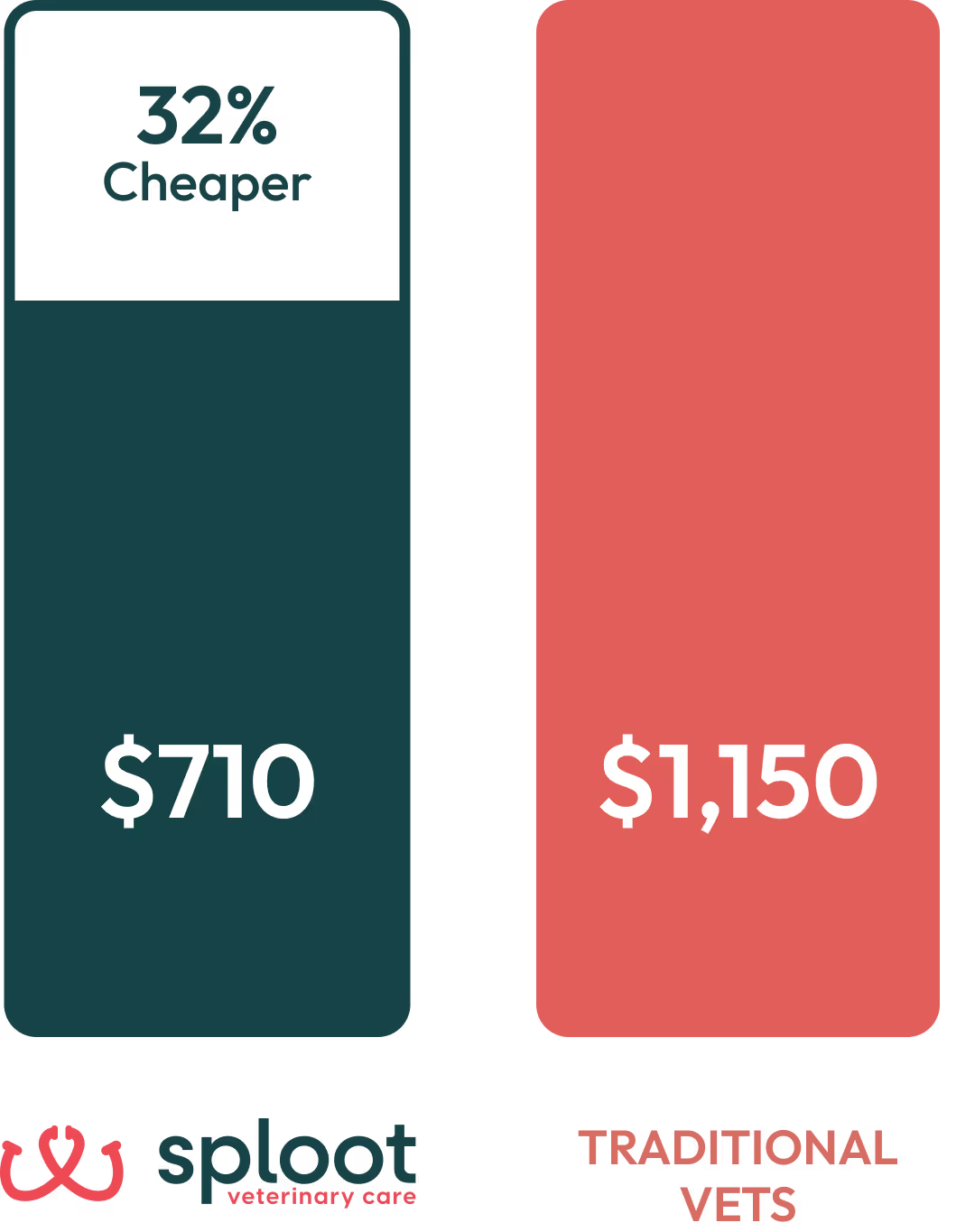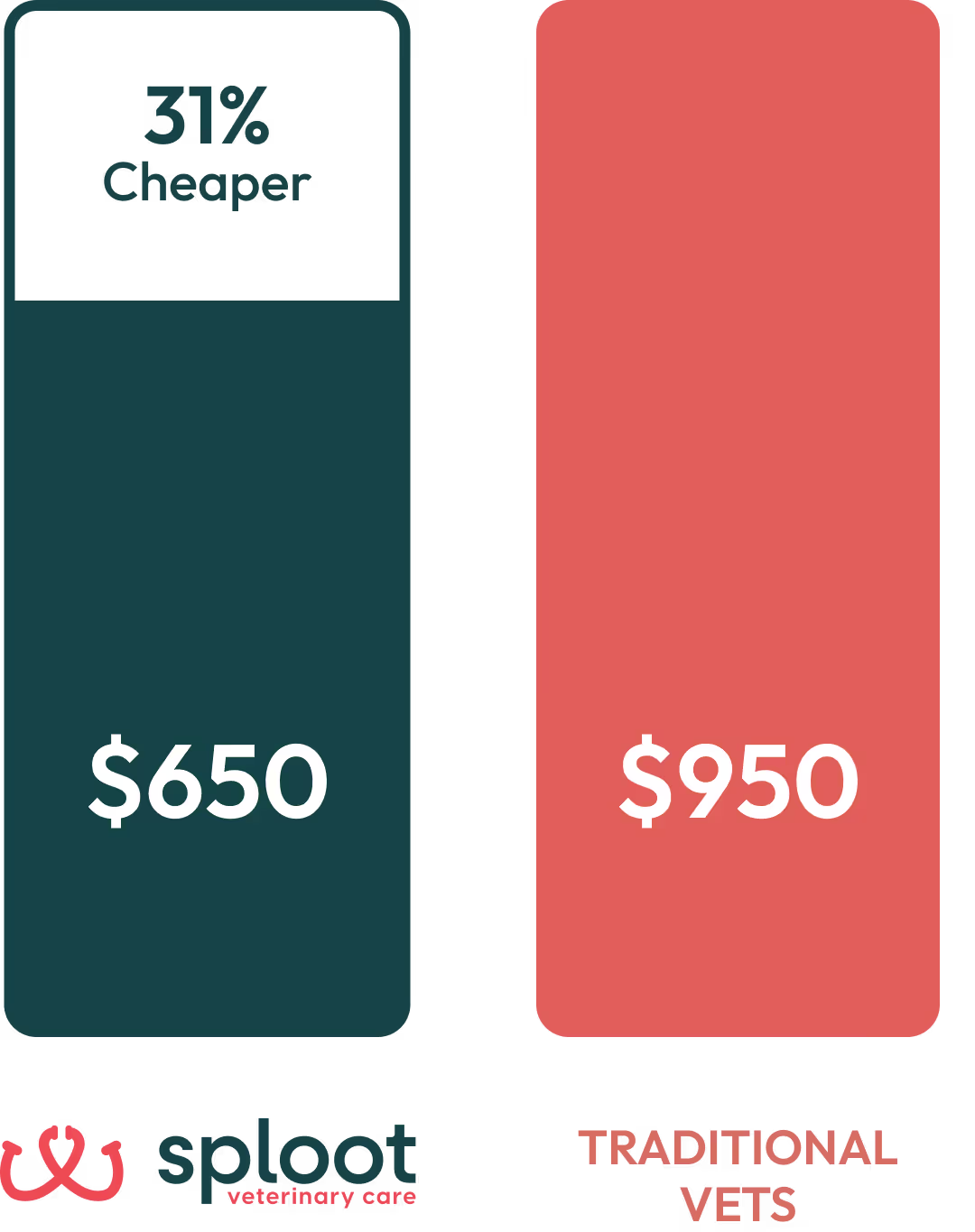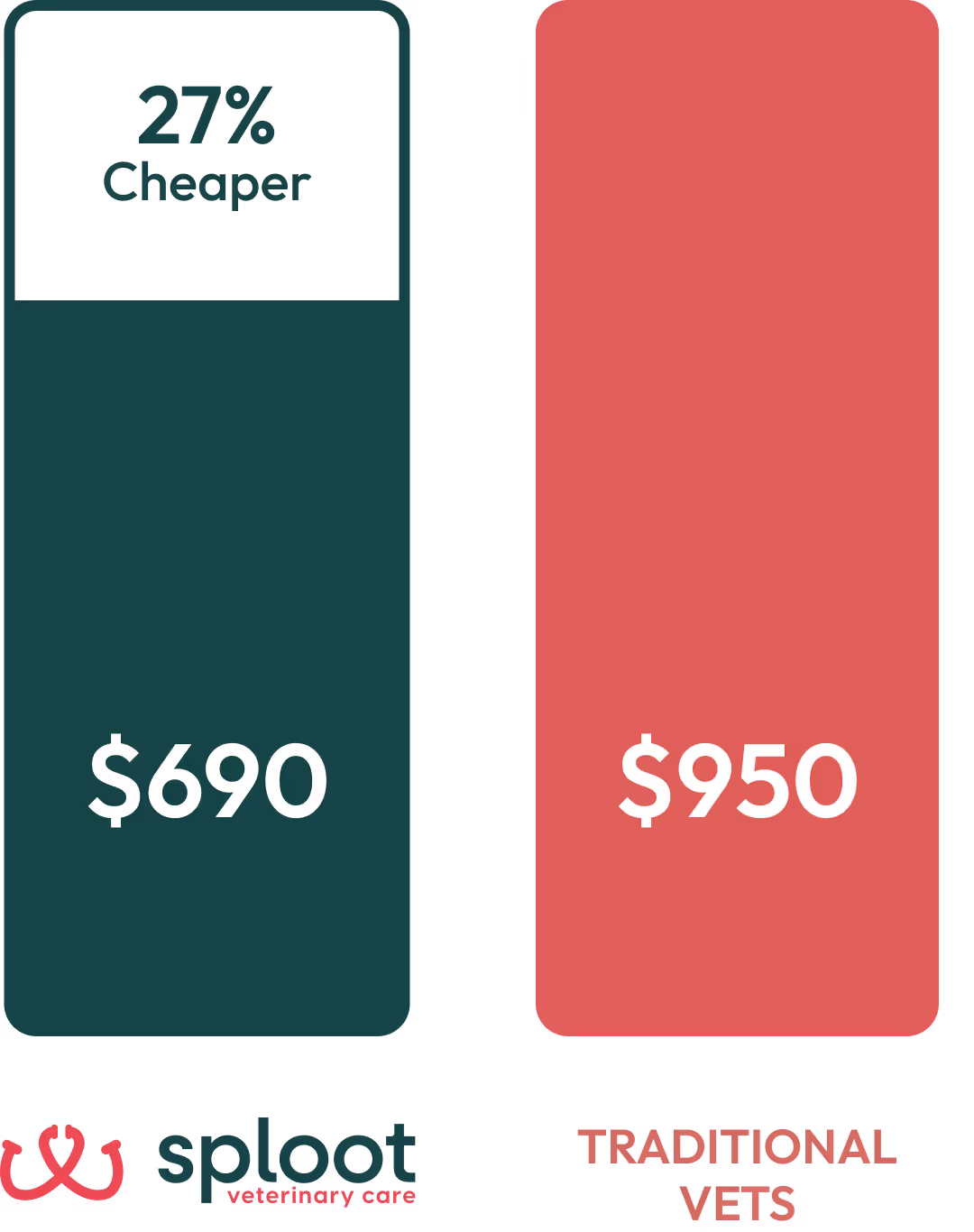
A happier, healthier smile starts here
Bad breath? That's your pet's gums trying to tell you something, and honestly, we're here for it. We listen, we clean, we comfort, and we send them home with that full-on cheese grin that makes your whole day better.We're looking forward to seeing you at your consultation. If you have any questions before then, feel free to reach out—or save them for your vet during your appointment.

Premium Pet Dental, Minus the Premium Price
💡Includes procedure, pre-op exam, and bloodwork
🛡️No hidden fees. Just expert care + full transparency.
Pricing reflects the average cost of a feline dental in Sploot’s market. Traditional vet pricing is based on the average minimum cost across 10+ local clinics, including consultation, bloodwork, and procedure. Sploot pricing represents the starting rate for SplootPack members and also includes consultation, bloodwork, and procedure.

Save big with SplootPack membership
That’s $600+ in savings— and the membership basically pays for itself before the year even begins.
Pricing reflects the average cost of a canine dental in Sploot’s market. Traditional vet pricing is based on the average minimum cost across 10+ local clinics, including consultation, bloodwork, and procedure. Sploot pricing represents the starting rate for SplootPack members and also includes consultation, bloodwork, and procedure.

Save big with SplootPack membership
That’s $600+ in savings— and the membership basically pays for itself before the year even begins.
Pricing reflects the average cost of a feline dental in Sploot’s market. Traditional vet pricing is based on the average minimum cost across 10+ local clinics, including consultation, bloodwork, and procedure. Sploot pricing represents the starting rate for SplootPack members and also includes consultation, bloodwork, and procedure.

Save big with SplootPack membership
That’s $600+ in savings— and the membership basically pays for itself before the year even begins.
Pricing reflects the average cost of a canine dental in Sploot’s market. Traditional vet pricing is based on the average minimum cost across 10+ local clinics, including consultation, bloodwork, and procedure. Sploot pricing represents the starting rate for SplootPack members and also includes consultation, bloodwork, and procedure.

Save big with SplootPack membership
That’s $600+ in savings— and the membership basically pays for itself before the year even begins.
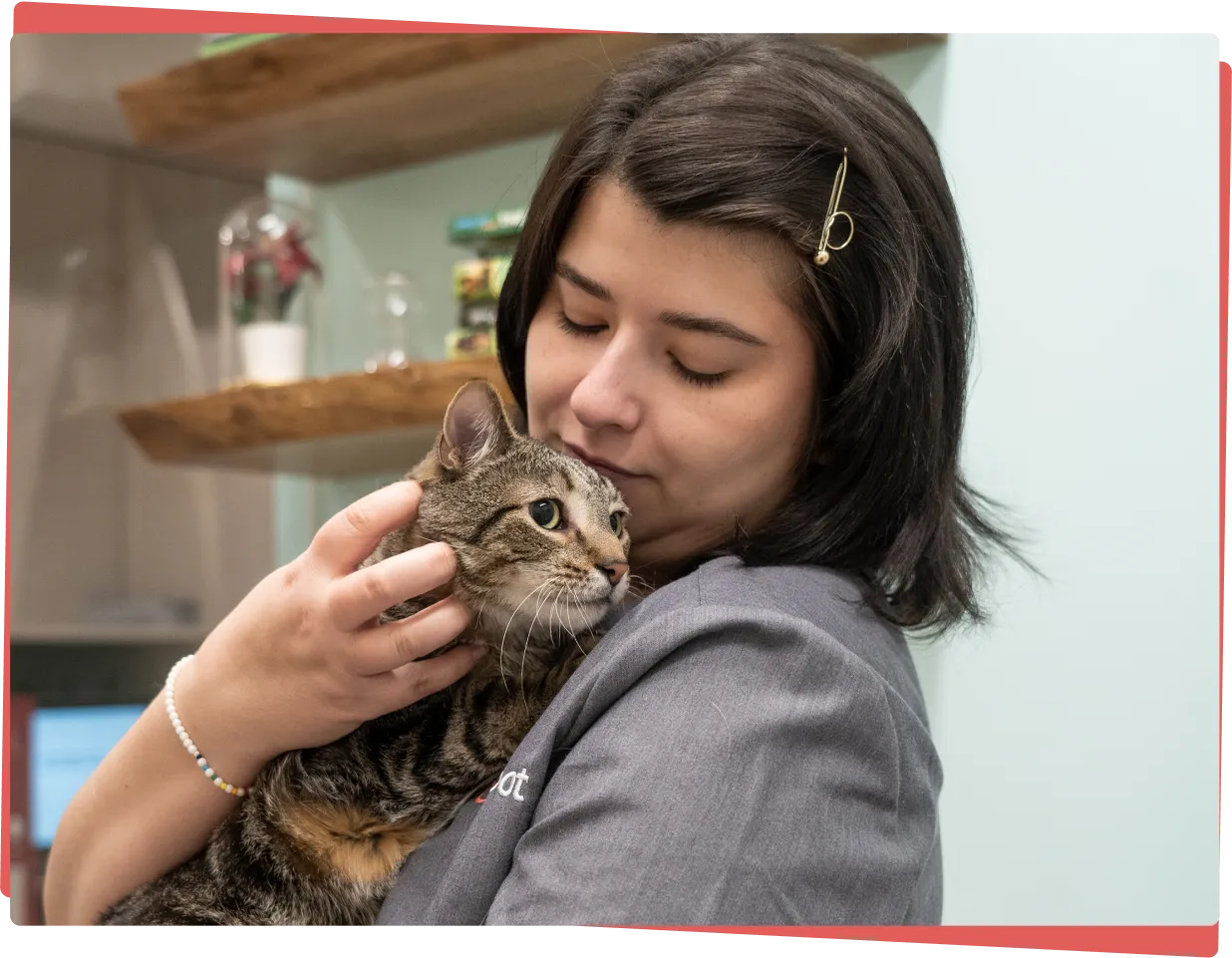
Save big with SplootPack membership


Paying over time with CareCredit
Optional CTA here (I think we dont have those at all in this page)
The four stages of periodontal disease
%20(1).webp)
Stage 1 begins with red, inflamed gums but no bone loss yet. It's totally reversible with a proper cleaning and good home care, which is why catching it here is ideal.
Stage 2 brings early bone loss, but we're talking less than 25% of the tooth's support structure. The mouth can still bounce back beautifully if we act now before it progresses.
Stage 3 shows deeper pockets and bone loss between 25–50%, which means teeth start loosening and pain's creeping in even if your pet's hiding it like the brave little champion they are.
Stage 4 is advanced territory where bone loss climbs past 50%, infections flare up, teeth fail, and the mouth genuinely hurts in a way that affects their whole body and quality of life.Here's the key thing to understand: we can't see the full picture until your pet's asleep and we get those X-rays, which is why the consult sets the stage and dental day tells the real story.
Dental disease happens in stages — the earlier you act, the easier (and cheaper) it is to treat.
Safety you can actually feel
Every single pet gets a custom plan based on their age, health, and specific needs. We track vitals the whole time they're under, keep them warm with heated blankets, cushion their joints so they're comfortable, watch them wake up gradually, call you with updates throughout the day, and send you home with crystal-clear instructions and a direct line if you need us after hours. Your pet is family here, and we treat them exactly like it.
A couple quick stories:
Milo
Milo the dog came in with dragon breath and a hesitant chew, and his human thought it was just age catching up. X-rays revealed hidden pockets of infection around two back teeth that were causing more pain than anyone realized. We cleaned deep, treated the trouble spots, and didn't need to extract anything.
Two weeks later, Milo's chasing his ball like a puppy and demolishing breakfast with enthusiasm his person hadn't seen in months. They sent us a photo: big smile, clear eyes, and a caption that said "my boy is back." That's the kind of transformation that reminds us why this work matters.
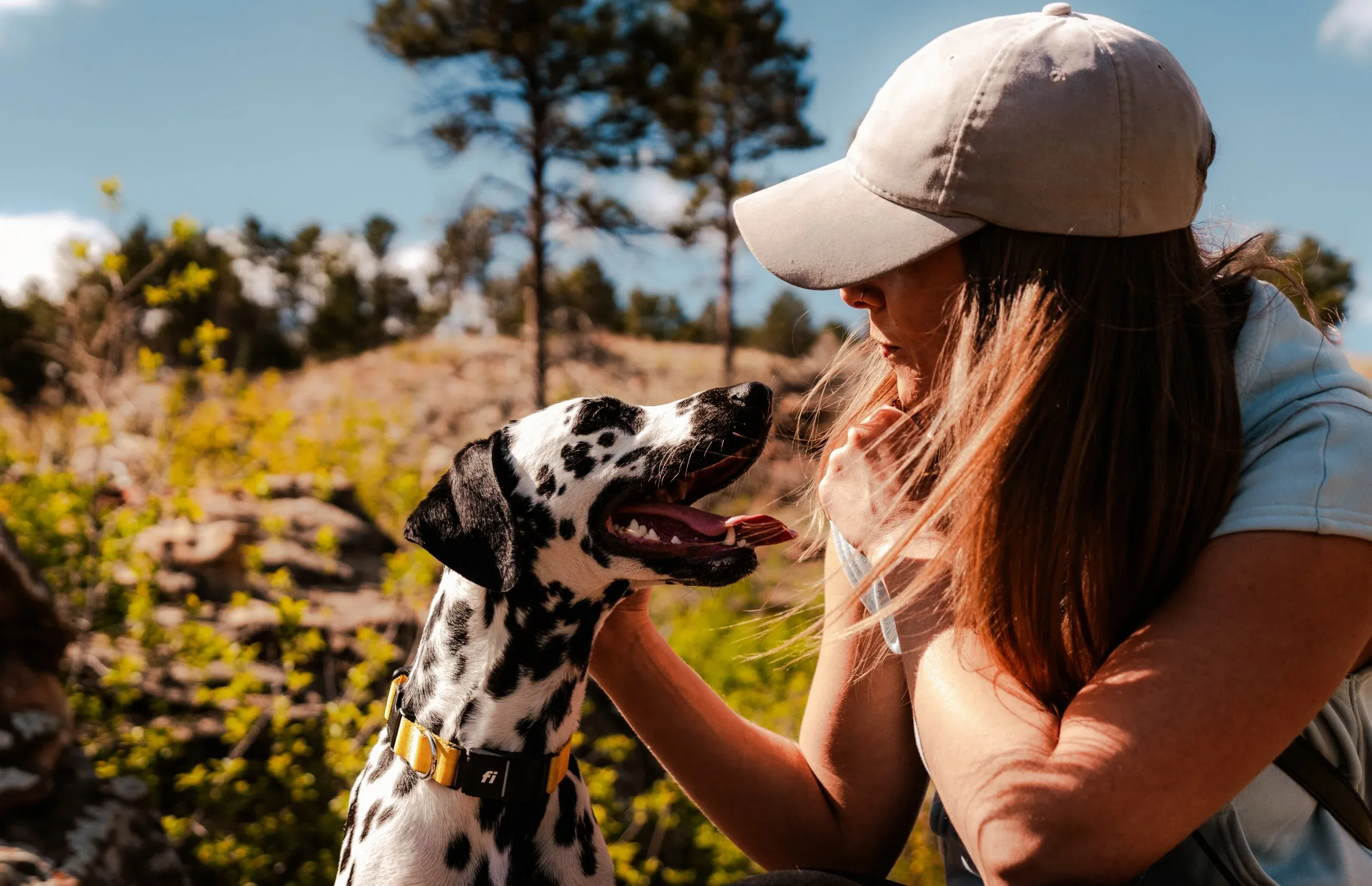
Luna
Luna the cat hid her pain like cats do—seemed sleepy and sweet on the surface, just a little less playful than usual. X-rays showed resorptive lesions that were stinging with every single bite, turning meals into something to endure rather than enjoy.
We removed the painful crowns and kept the healthy roots where medically appropriate. She purred in her carrier on the way home, and her family says she plays again, jumps on counters again, acts like herself again. That's exactly why we do this.

Ready when you are
We're excited to meet your pet and help them feel their best. If any other questions come up before your consultation, don't hesitate to ask your vet when you're here—we're always happy to talk through anything on your mind.
Clean mouth, happy pet, easier life. Let's get you there.
FREQUENTLY ASKED QUESTIONS

Yes! We run full exams and bloodwork beforehand to minimize risk and monitor your pet from start to finish.

It’s a less invasive procedure for certain teeth (like in cats) where we remove the visible part of the tooth but leave healthy roots intact — it’s only used when medically appropriate.

We don’t recommend it. It only removes surface plaque and misses disease below the gums — where the real problems start.

We’ll call you during the procedure to review findings and get approval before proceeding.

Most pets go home the same day and are back to their normal selves within 24 hours.

Once a year for most pets, but please talk to your vet as this can vary depending on the type of pet, breed, and size.

We offer financing through the CareCredit credit card. Additionally, the SplootPack can help save 15% on the procedure as well as waived exam fees; up to 3 for the year. Additionally, if you come back to Sploot for urgent care or vaccinations you will also receive a 10% discount on everything else.

Dental cleanings under anesthesia are the gold standard in pet dentistry. Dental cleanings without anesthesia can be traumatic and difficult for most pets. More importantly, anesthesia allows our doctors to go beyond surface level cleaning and tackle to root cause of oral disease - keeping your pet’s oral health happy and healthy into their senior years.
For this reason, all of our dental procedures are performed under anesthesia.

During your consultation, we will perform a blood test to assess the health of your pet. If your vet thinks your pet is a good candidate for the procedure, you will have 30 days after your consultation before the physical evaluation expires.

By evaluating the tartar and plaque buildup, your vet will have a good idea of the care needed. However, they won’t have a full understanding until they perform x-rays and examine beneath the gums.

While the full assessment of your pet’s dental care needs will occur during the procedure, not the consultation, your vet can initially gauge the amount of plaque and tartar buildup. This will give you a good idea of what to expect on the day of the exam.

The cost of a dental procedure will depend on the level of care your pet requires. While we can’t give an exact price upfront, we’ll provide a detailed estimate based on your vet’s assessment during the consultation. For example, pets needing tooth extractions due to severe gum disease will incur higher costs compared to a routine cleaning. However, pets that receive regular dental cleanings are typically less likely to need more extensive (and expensive) procedures in the future.

We perform a variety of blood tests and physical exams to ensure your pet is in the right condition to undergo anesthesia. Sploot provides a higher level of monitoring after procedures to ensure, during the most vulnerable part of the procedure, your pet is properly taken care of.

Got Questions? Call or Text!
Whether you've got a worrying situation or just have care questions, we've got your back.







